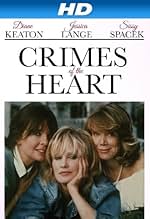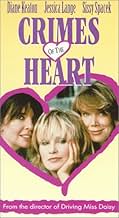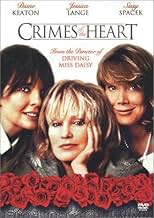AVALIAÇÃO DA IMDb
6,3/10
4,7 mil
SUA AVALIAÇÃO
Adicionar um enredo no seu idiomaThree southern sisters try to come to grips with the meaning of their mother's suicide.Three southern sisters try to come to grips with the meaning of their mother's suicide.Three southern sisters try to come to grips with the meaning of their mother's suicide.
- Indicado a 3 Oscars
- 3 vitórias e 4 indicações no total
Gregory Eugene Travis
- Willie Jay
- (as Gregory Travis)
Robert J. Maxwell
- Bus Passenger
- (não creditado)
Avaliações em destaque
Mississippi-born Beth Henley adapted her Pulitzer-prize winning play to the screen and, for that reason alone, is worth a look-see especially if you haven't seen the theatre production. Directed here by Bruce Beresford, this is quintessential Henley -- her first work to be produced professionally -- offering the story of the three quirky, maladjusted Magrath sisters, who reunite following family misfortune to reflect on their unstable past, present and futures.
Lenny, the eldest sister, is the repressed 'plain Jane' self-imposed into early spinsterhood because of her barren condition. Considering herself damaged goods, she now conducts her life as such, tending to her garden and other non-romantic pursuits. Meg, in the middle, is the listless live wire, the capricious, hard-living beauty who fled the coop early to pursue an aimless career in Hollywood as a singer. The prodigal daughter finally returns, rather reluctantly, when serious trouble brews back home. Babe, the youngest and most susceptible to eccentric behavior, seems to take after their dead, self-destructive mother (a suicide) as she battles with manic depression and resorts to off-the-wall bits of craziness. In jail at the present for critically shooting her husband (she "didn't like his looks"), her bizarre action prompts this filial reunion.
As served up by a triune of powerhouse, Oscar-winning ladies, the star performances should have really cooked. Instead they seems unoriginal and pat. Diane Keaton and Jessica Lange are overtly mannered as the two older sisters Lenny and Meg. Keaton especially, easily the "Sandy Dennis of the 70s and 80s", has her neurotic fireworks on full display. The snorting laughter, the flailing gestures, the quizzical eye-rolling, the stammering speeches. What seemed delightfully offbeat in Woody Allen comedies has become old hat and irksome as the years roll on. Lange, too, has her patented affectations on all four burners. The far-away gaze, the slow, reflective speech patterns, the whimsical, lackadaisical laugh and edgy stance. Both of the actresses have represented themselves much better in other vehicles. Ironically, Sissy Spacek, whose character lends itself to be the most neurotic of the three, comes off more inspired and assured -- a complete departure, by the way, from her typical "Coal Miner's Daughter" money-maker. Good for her.
In support, rangy actor/writer Sam Shepard, Lange's long-time off-camera squeeze, has little to do here but look longingly as Lange's on-camera squeeze. But Tess Harper goes way overboard as the overly-opiniated Chick, the snippy, mullet-haired cousin and next-door neighbor, who stereotypes the vicious down-home chatterbox to the nth degree. While her villainy (which kept jogging my memory of wonderful Madeleine Sherwood's Sister Woman portrayal in "Cat On a Hot Tin Roof") certainly enlivens the action as chief foil to the sisters, they tear down the walls of believability as well.
Despite some well-acted moments from this unarguably talented cast, the overbaked production cannot overcome its stagy origins, striving much too much to push the "black comedy" element down the viewer's throat. One wacky scene has Diane Keaton chasing Tess Harper out of her house and around the backyard with a broom, a bit that comes off just plain ridiculous even though it's meant to be a catalyst for liberating Keaton's Lenny character. I'm sorry, but broom-chasing went out with Marjorie Main's "Ma Kettle" character years ago. This and other eccentric scenes simply come off forced, as if the actors are playing the intention instead of the moment. Lange and Shepard's giddy dancing drunk scene, Spacek's over-sugared lemonade bit, and even Keaton's impromptu birthday cake segment are guilty of this felonious acting charge.
While definitely Tennessee Williams-influenced, the rather thin Henley story and characters pale in comparison. Working much better on stage, this movie remains, however, a curiosity item that somehow ended up on simmer instead of boil, despite the obvious potential.
Lenny, the eldest sister, is the repressed 'plain Jane' self-imposed into early spinsterhood because of her barren condition. Considering herself damaged goods, she now conducts her life as such, tending to her garden and other non-romantic pursuits. Meg, in the middle, is the listless live wire, the capricious, hard-living beauty who fled the coop early to pursue an aimless career in Hollywood as a singer. The prodigal daughter finally returns, rather reluctantly, when serious trouble brews back home. Babe, the youngest and most susceptible to eccentric behavior, seems to take after their dead, self-destructive mother (a suicide) as she battles with manic depression and resorts to off-the-wall bits of craziness. In jail at the present for critically shooting her husband (she "didn't like his looks"), her bizarre action prompts this filial reunion.
As served up by a triune of powerhouse, Oscar-winning ladies, the star performances should have really cooked. Instead they seems unoriginal and pat. Diane Keaton and Jessica Lange are overtly mannered as the two older sisters Lenny and Meg. Keaton especially, easily the "Sandy Dennis of the 70s and 80s", has her neurotic fireworks on full display. The snorting laughter, the flailing gestures, the quizzical eye-rolling, the stammering speeches. What seemed delightfully offbeat in Woody Allen comedies has become old hat and irksome as the years roll on. Lange, too, has her patented affectations on all four burners. The far-away gaze, the slow, reflective speech patterns, the whimsical, lackadaisical laugh and edgy stance. Both of the actresses have represented themselves much better in other vehicles. Ironically, Sissy Spacek, whose character lends itself to be the most neurotic of the three, comes off more inspired and assured -- a complete departure, by the way, from her typical "Coal Miner's Daughter" money-maker. Good for her.
In support, rangy actor/writer Sam Shepard, Lange's long-time off-camera squeeze, has little to do here but look longingly as Lange's on-camera squeeze. But Tess Harper goes way overboard as the overly-opiniated Chick, the snippy, mullet-haired cousin and next-door neighbor, who stereotypes the vicious down-home chatterbox to the nth degree. While her villainy (which kept jogging my memory of wonderful Madeleine Sherwood's Sister Woman portrayal in "Cat On a Hot Tin Roof") certainly enlivens the action as chief foil to the sisters, they tear down the walls of believability as well.
Despite some well-acted moments from this unarguably talented cast, the overbaked production cannot overcome its stagy origins, striving much too much to push the "black comedy" element down the viewer's throat. One wacky scene has Diane Keaton chasing Tess Harper out of her house and around the backyard with a broom, a bit that comes off just plain ridiculous even though it's meant to be a catalyst for liberating Keaton's Lenny character. I'm sorry, but broom-chasing went out with Marjorie Main's "Ma Kettle" character years ago. This and other eccentric scenes simply come off forced, as if the actors are playing the intention instead of the moment. Lange and Shepard's giddy dancing drunk scene, Spacek's over-sugared lemonade bit, and even Keaton's impromptu birthday cake segment are guilty of this felonious acting charge.
While definitely Tennessee Williams-influenced, the rather thin Henley story and characters pale in comparison. Working much better on stage, this movie remains, however, a curiosity item that somehow ended up on simmer instead of boil, despite the obvious potential.
Based on the successful play this film gathered an ensemble of some of the most talented actors and actresses of our time, which includes Sissy Spacek, Sam Shepard, Tess Harper, Diane Keaton, and Jessica Lange. Taking place in the south, we follow the story of a family's relationship and how they are dealing with their sister shooting her husband. With the strong female cast we can't help but to feel their pain through their emotions, relationship with each other, and how they deal with life. Great strong character choices, yet sisters with something even greater in common....love of family, and loyalty. There are many lessons to learn in this film and one of the most important is you can't turn your back on your family, even when you run away they will be there for you. The acting is superb, the honesty is great and in all a wonderful film to see. A true classic and if you haven't seen the play, read it or rented it.....do it now...you won't be disappointed.
9sol-
An entertaining outrageous black comedy, it is supported by three excellent leading performances, although Sissy Spacek is by far the best, and the camera-work from Dante Spinotti is excellent, with creative camera angles and good use of panning. The film tries to bring in a nostalgic sense too though, and does not quite succeed, and the drama of the material does not mix well with the comedy. The choices of music are not too good either, and Tess Harper comes across as very annoying in an over-the-top way, but the virtues of the film are better than its shortcomings. The film comes across as rather lightweight with its black comedy treatment, but it certainly raises some issues with families and coping with one's past, among other ideas. It is not however a film to watch for its messages, but one to simply enjoy for its amusing parts and cinematic virtues, which include some good sound recording too.
Honestly, there's not a lot to say about this film. Sissy Spacek, Diane Keaton and Jessica Lange star as three Southern sisters who reunite when one (Spacek) shoots her husband. The sisters are, of course, incredibly different and their personalities collide over the course of a few days, dealing with what Spacek's character has done while old feuds come to the surface. Clearly based on a play, most of the action takes place in the same house and the film puts everything on the shoulders of the three central women.
Keaton plays Lenny, the matriarch of the trio (both of their parents are deceased and their grandfather who raised them is in the hospital) who is socially inept and often gets stepped on by her siblings. Lange is Meg, the popular and outgoing wild girl, man-eater and failed actress. Spacek rounds it out as the potentially insane and murderous Babe. Tess Harper steals her few scenes as Chick Boyle, who lives next door to the house, but the whole thing is centered around the three sisters and that's what makes it work. The film never takes itself too seriously, despite it's morbid themes and narrative, and the women all do a marvelous job of bringing the laughs mostly without overdoing it.
Crimes of the Heart is a film that on paper doesn't appeal to my tastes at all, but I often found myself cracking up at the ridiculousness of these characters. The women play the characters as straight as possible, approaching them as characters rather than jokes, and this helps make it an enjoyable experience as opposed to a grating one, although Keaton does overdo it at times. The characters are erratic and very large, which opens itself up to potential disaster, but in selecting the proper actresses for each role they were able to make it an entertaining little movie. It's a simple, light and enjoyable film; certainly nothing memorable and I'm sure I won't be thinking about it at all in a few days, but a nice experience while it lasts.
Keaton plays Lenny, the matriarch of the trio (both of their parents are deceased and their grandfather who raised them is in the hospital) who is socially inept and often gets stepped on by her siblings. Lange is Meg, the popular and outgoing wild girl, man-eater and failed actress. Spacek rounds it out as the potentially insane and murderous Babe. Tess Harper steals her few scenes as Chick Boyle, who lives next door to the house, but the whole thing is centered around the three sisters and that's what makes it work. The film never takes itself too seriously, despite it's morbid themes and narrative, and the women all do a marvelous job of bringing the laughs mostly without overdoing it.
Crimes of the Heart is a film that on paper doesn't appeal to my tastes at all, but I often found myself cracking up at the ridiculousness of these characters. The women play the characters as straight as possible, approaching them as characters rather than jokes, and this helps make it an enjoyable experience as opposed to a grating one, although Keaton does overdo it at times. The characters are erratic and very large, which opens itself up to potential disaster, but in selecting the proper actresses for each role they were able to make it an entertaining little movie. It's a simple, light and enjoyable film; certainly nothing memorable and I'm sure I won't be thinking about it at all in a few days, but a nice experience while it lasts.
Usually when I sense that the actors had a great time making a movie, the result isn't particularly noteworthy. ("Cannonball Run" comes to mind.) But "Crimes of the Heart" is an exception. If Jessica Lange, Diane Keaton and Sissy Spacek weren't absolutely delighted to tackle the lead roles in this film, they are much better actors than I thought.
The material is reminiscent of Flannery O'Connor, who wrote some of the most humorous, offbeat Southern fiction extant.
The three sisters are so controlled by their visceral reactions that one wonders if any of them have ever had an intellectual moment. Although it would be maddening to have such people for friends, they're great instruments for movie comedy.
One final note: If anyone thinks Sissy Spacek is goofy-looking (as I used to), they will change their mind when they see her in this. She is absolutely gorgeous here.
The material is reminiscent of Flannery O'Connor, who wrote some of the most humorous, offbeat Southern fiction extant.
The three sisters are so controlled by their visceral reactions that one wonders if any of them have ever had an intellectual moment. Although it would be maddening to have such people for friends, they're great instruments for movie comedy.
One final note: If anyone thinks Sissy Spacek is goofy-looking (as I used to), they will change their mind when they see her in this. She is absolutely gorgeous here.
Você sabia?
- CuriosidadesJessica Lange was pregnant during principal photography. Lange gave birth to her second child at age 36, a daughter Hannah Jane Shepard on 13th January 1986. The child's father is her then partner and co-star in this film, Sam Shepard.
- Citações
Meg Magrath: Why'd you do it, Babe ? Why'd you put your head in the oven?
Babe Magrath: I don't know... I'm having a bad day.
- Trilhas sonorasHappy Birthday to You
Written by Mildred J. Hill and Patty S. Hill
Publisher Summy-Birchard Music Division of Birch Tree Group Ltd.
Principais escolhas
Faça login para avaliar e ver a lista de recomendações personalizadas
- How long is Crimes of the Heart?Fornecido pela Alexa
Detalhes
- Data de lançamento
- País de origem
- Idioma
- Também conhecido como
- Crimes of the Heart
- Locações de filme
- Empresa de produção
- Consulte mais créditos da empresa na IMDbPro
Bilheteria
- Orçamento
- US$ 20.000.000 (estimativa)
- Faturamento bruto nos EUA e Canadá
- US$ 22.905.522
- Fim de semana de estreia nos EUA e Canadá
- US$ 1.402.921
- 14 de dez. de 1986
- Faturamento bruto mundial
- US$ 22.905.522
- Tempo de duração1 hora 45 minutos
- Mixagem de som
- Proporção
- 1.85 : 1
Contribua para esta página
Sugerir uma alteração ou adicionar conteúdo ausente

Principal brecha
By what name was Crimes do Coração (1986) officially released in India in English?
Responda
![Assistir a Trailer [EN]](https://m.media-amazon.com/images/M/MV5BNGI3NmEwMTgtNGUxYy00YTlhLWI1ODEtNjkxYmQxMjVjNTU0XkEyXkFqcGdeQXRyYW5zY29kZS13b3JrZmxvdw@@._V1_QL75_UX500_CR0)




























